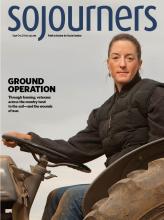I'M DREAMING. Ten young men about my son’s age are singing me a Mother’s Day greeting to the tune of “Happy Birthday.” I recognize the melody, of course, but the language is foreign. Still, I’m delighted; I clap and laugh.
Oh, wait. It’s Mother’s Day 2014 and I’m not dreaming. In a refugee camp in Jordan, 10 young Syrian men are singing beautiful Arabic words to me and two other visiting American moms. It’s our last stop in an intense week of refugee visits; it feels good to be laughing.
The singing men, and the young Syrian women who joined us as we toured an educational compound in the Za’atari U.N. refugee camp, were bright university students in Syria before the war—future historians, mathematicians, teachers, agricultural engineers; some just months from graduating—when the violence of Syria’s civil war forced them to flee.
“But when you end up in a refugee camp,” one of the young men explained, “people treat you like idiots. Like you understand nothing.” Herein lies one of the great refugee tragedies. Living at the mercy of others and with little respect, no decision-making freedom, and no control over their future often fuels anger and hopelessness in young refugees.
Read the Full Article

